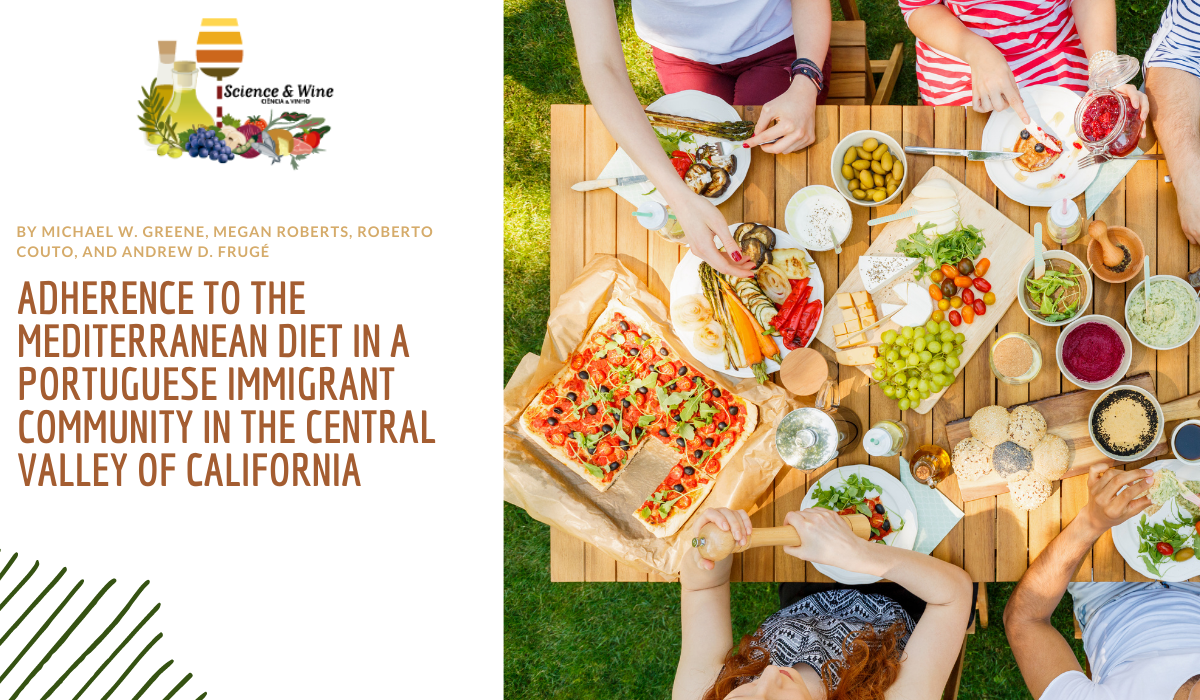By Michael W. Greene, Megan Roberts, Roberto Couto, and Andrew D. Frugé
It is known in practically any culture that there isn’t anything like your mother’s cooking. Well, for most of us. But how exactly did your mother learn what to cook? Cultures from every geographical region have adopted and ingrained traditions into each of their communal members which have been passed down for centuries from generation to generation. The inheritance of cultural cuisine traditions, such as those associated with the Mediterranean Diet (MedDiet), are no different. But what happens when people from regions with a cultural heritage of the MedDiet immigrate to new locations and cross into different cultural cuisine boundaries? Do they take the MedDiet dietary traditions with them? Are there barriers to holding on to their dietary roots? A recent study in a Portuguese immigrant community in the United States has addressed these questions [1].
Within the Mediterranean region, dietary habits go beyond simply food selection. The MedDiet consists of a plant-based dietary pattern that has been widely reported as a model of healthy eating that reduces non-communicable disease risk and promotes quality of life, specifically for purposes of healthful aging [1]. Even though the MedDiet is not strictly defined, it is traditionally characterized by a high consumption of fruits, vegetables, whole grains, olive oil, and nuts; a moderate amount of chicken and fish; lower consumption of dairy, red meat and sugars; the use of aromatic herbs; water as a primary beverage; and wine, of course in moderation, while respecting social beliefs [2]. Importantly the MedDiet also has social components, including conviviality, and is considered more a way of life than solely a dietary pattern.

The MedDiet may stem from the Mediterranean basin, but adherence goes beyond the group of countries bordering the Mediterranean Sea. Portugal, for example, is not located directly within the basin but has ancestral ties and food-related influences from their Mediterranean neighbors. Thus, the MedDiet is a settled cultural heritage of the Portuguese population [3]. It is only fitting that with the MedDiet being a dietary pattern, there is also a pattern of regional adherence that takes place within the country itself. Within Portugal, the regions of Algarve and Madeira have the highest observed MedDiet adherence, while regions such as Lisbon, Tejo Valley, and Azores have the lowest [4].
This trend also has been observed within the United States. When comparing MedDiet adherence within California to the Stroke Belt, a fourteen-state region primarily in the southeastern United States, MedDiet adherence scores were lower in the Stoke Belt in comparison to its California counterparts [5]. These findings of low MedDiet adherence within the Stroke Belt were significantly associated with four main perceived barriers: knowledge, convenience, sensory appeal, and health. Thus, regional barriers to the MedDiet present in the United States that may also be present in other geographical locations.

Even though MedDiet adherence has previously been assessed in populations living throughout the world, few studies have examined MedDiet adherence in communities with immigrants from countries in which the MedDiet is a settled cultural heritage [1]. When investigating a Portuguese immigrant community within the United States using previously validated survey instruments, MedDiet adherence and perceived benefits and barriers to MedDiet adherence were examined. Adults were recruited at a local grocery store chain from Turlock and Livermore, two communities within the California Central Valley, to participate in the study. Consistent with Turlock being a Portuguese immigrant community, approximately 37% of the Turlock participants took the survey in Portuguese. No surveys were completed in Portuguese among the Livermore participants. When comparing the two communities, Mediterranean Diet adherence scores were higher in Turlock participants compared to the Livermore participants.
Along with Turlock’s rural location, participants from this region also had lower education attainment. Typically, these two factors would lead to a lower MedDiet adherence score as seen in previous studies [6, 7, 8]. This finding is also interesting because the majority of immigrants from Portugal to the United States were from the Azores, which, compared to other regions of Portugal, has low MedDiet adherence [4]. There are several potential reasons for these findings. For example, there was a perceived benefit of familiarity with the MedDiet observed in the Turlock group which may be due to knowledge of the Portuguese cultural cuisine that aligns with components of the MedDiet. Higher MedDiet adherence scores in Turlock could have also been due to the “Healthy Immigrant Effect” where immigrants are on average healthier than the native-born participants in a given location [4]. This would especially ring true when comparing the MedDiet to a Western Diet found in the United States that consists of a multitude of unhealthy components. Whichever factors aided in adherence, Turlock participants overcame the perceived barriers that were assessed such as convenience and sensory appeal, to still have higher MedDiet adherence scores than those of Livermore.
As adherence to the MedDiet along with its percieved benefits and barriers continue to be assessed, there is a need for promotion and expansion of the MedDiet. An innovative model has been proposed to strengthen the MedDiet in Portugal to improve overall health of its citizens and the environment and while also positively impacting the economy and tourism [9]. The four pillars of the model include: food, conviviality, lifestyle, and sustainable food production [9]. This model has the potential to inspire other countries both within and outside the Mediterranean basin to promote and facilitate adoption of the MedDiet. This would be especially beneficial in the United States, a country with high prevalence of Western diet consumption. Our findings of high MedDiet adherence in a Portuguese immigrant community in the United States suggest that populations can overcome perceived barriers to maintain MedDiet adherence. Given the spread of the Western diet to countries across the globe, the MedDiet with its strong cultural heritage may just be strong enough to continue to grow deeper throughout the world if the will is there for countries to promote the MedDiet.

Michael W. Greene, Ph.D.
Department of Nutrition, Dietetics, and Hospitality Management
College of Human Sciences
Auburn University
260 Lem Morrison Dr./101C PSB
Auburn, AL 36849
Office Phone: 334-844-8435
Email: mwgreene@auburn.edu
Lab Website: http://auburn.edu/greenelab
References
- Couto, R.M.; Frugé, A.D.; Greene, M.W. Adherence to the Mediterranean Diet in a Portuguese Immigrant Community in the Central Valley of California. Nutrients 2021, 13, 1989.
- Davis, C.; Bryan, J.; Hodgson, J.; Murphy, K. Definition of the Mediterranean diet; a literature review. Nutrients 2015, 7, 9139–9153.
- Reguant-Aleix, J.; Sensat, F. The Mediterranean diet, intangible cultural heritage of humanity. In Mediterra 2012; CIHEAM–Sciences Po Les Presses: Paris, France, 2012; pp. 465–484.
- Rodrigues, S.; Caraher, M.; Trichopoulou, A.; De Almeida, M. Portuguese households’ diet quality (adherence to Mediterranean food pattern and compliance with WHO population dietary goals): Trends, regional disparities and socioeconomic determinants. Eur. J. Clin. Nutr. 2008, 62, 1263–1272.
- Bottcher, M.R.; Marincic, P.Z.; Nahay, K.L.; Baerlocher, B.E.; Willis, A.W.; Park, J.; Gaillard, P.; Greene, M.W. Nutrition knowledge and Mediterranean diet adherence in the southeast United States: Validation of a field-based survey instrument. Appetite 2017, 111, 166–176.
- Knight, C.J.; Jackson, O.; Rahman, I.; Burnett, D.O.; Frugé, A.D.; Greene, M.W. The Mediterranean diet in the Stroke Belt:A cross-sectional study on adherence and perceived knowledge, barriers, and benefits. Nutrients 2019, 11, 1847.
- Cavaliere, A.; De Marchi, E.; Banterle, A. Exploring the adherence to the Mediterranean diet and its relationship with individual lifestyle: The role of healthy behaviors, pro-environmental behaviors, income, and education. Nutrients 2018, 10, 141.
- Ruggiero, E.; Di Castelnuovo, A.; Costanzo, S.; Persichillo, M.; Bracone, F.; Cerletti, C.; Donati, M.B.; de Gaetano, G.; Iacoviello, L.; Bonaccio, M. Socioeconomic and psychosocial determinants of adherence to the Mediterranean diet in a general adult Italian population. Eur. J. Public Health 2019, 29, 328–335.
- Real, H.; Dias, R. R.; & Graça, P. Mediterranean Diet conceptual model and future trends of its use in Portugal. Health promotion international 2021, 36(2), 548–560.

